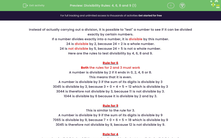Instead of actually carrying out a division, it is possible to test a number to see if it can be divided exactly by certain numbers.
If a number divides exactly into a number, it is divisible by this number.
24 is divisible by 2 because 24 ÷ 2 is a whole number.
24 is not divisible by 5 because 24 ÷ 5 is not a whole number.
Here are the rules to test divisibility by 4, 6, 8 and 9.
Rule for 6
Both the rules for 2 and 3 must work
A number is divisible by 2 if it ends in 0, 2, 4, 6 or 8.
This means that it must be even.
A number is divisible by 3 if the sum of its digits is divisible by 3.
3045 is divisible by 3 because 3 + 0 + 4 + 5 = 12 which is divisible by 3.
3044 is therefore not divisible by 3 because 11 is not divisible by 3.
1044 is divisible by 6 because it is divisible by 2 and by 3.
Rule for 9
This is similar to the rule for 3.
A number is divisible by 9 if the sum of its digits is divisible by 9.
7065 is divisible by 9 because 7 + 0 + 6 + 5 = 18 which is divisible by 9.
3045 is therefore not divisible by 9 because 12 is not divisible by 9.
Rule for 4
A number is divisible by 4 if the number formed by its last two digits is divisible by 4.
3140 is divisible by 4 because 40 is divisible by 4.
3145 is not divisible by 4 because 45 is not divisible by 4.
Rule for 8
A number is divisible by 8 if the number formed by its last three digits is divisible by 8.
3240 is divisible by 8 because 240 is divisible by 8.
3145 is not divisible by 8 because 145 is not divisible by 8.
Example
Is 3813 divisible by 6?
Answer
No, because although 3 + 8 + 1 + 3 = 15 is divisible by 3, it is not divisible by 2 as it ends in a 3, which is an odd number.
Example
Is 2,153,864 divisible by 4?
Answer
Yes because 64 is divisible by 4.
Have you got the hang of this?

Let's have a go at some questions. If you get stuck, you can look back to this page by clicking on the pink button at the side of the screen.








